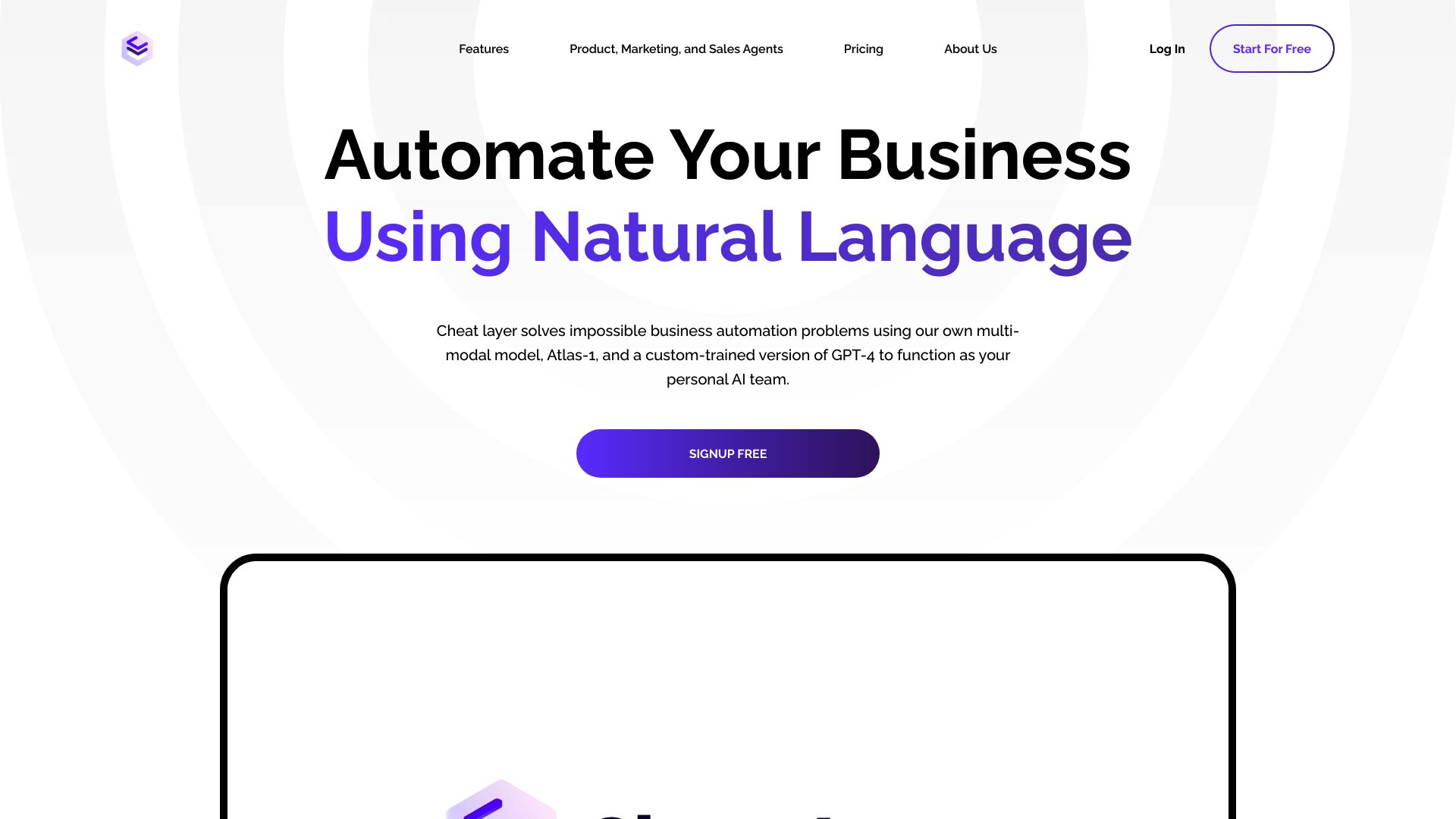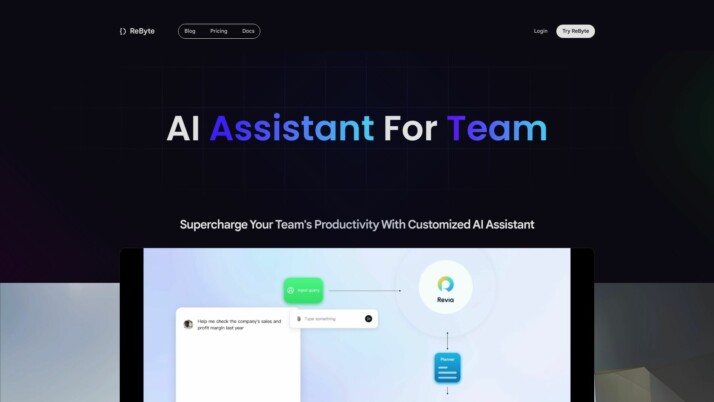Cheat Layer vs. Rebyte: Comparing AI Automation Platforms
AI-powered platforms revolutionize business processes, empowering organizations to achieve unprecedented efficiency and innovation. This comparison delves into the capabilities of Cheat Layer vs. Rebyte, and SmythOS, three leading solutions in the AI automation space. We examine their core features, development approaches, and unique selling points to help you determine which platform best aligns with your business needs. Whether you’re a developer seeking robust API integrations, a business leader focused on scalability and security, or a non-technical professional looking for user-friendly tools, this analysis provides valuable insights to guide your decision-making process in adopting AI-driven automation.
Cheat Layer Overview
Cheat Layer offers a powerful business automation platform leveraging AI to solve complex automation challenges. The platform’s core, Project Atlas Framework, enables users to generate sophisticated automations through natural language interactions, making it accessible even to non-technical users.
Cheat Layer’s custom-trained version of GPT-4 and multi-modal model Atlas-1 form the foundation of its capabilities. The platform excels in creating end-to-end solutions for marketing, sales, and general business processes. Its Semantic Targets feature ensures automations remain functional even when target services update, providing longevity and accuracy to implementations.


The platform shines with its 1-Click Cloud Agents, allowing users to deploy pre-built marketing and sales agents directly from mobile devices. This feature streamlines processes like content generation, A/B testing, and lead generation. Cheat Layer’s Live Mode facilitates iterative building and deployment of products such as apps and landing pages, providing real-time feedback to ensure outputs align with intended goals.
Cheat Layer’s no-code interface, featuring a drag-and-drop editor, makes automation creation accessible to users without coding knowledge.
Cheat Layer’s no-code interface, featuring a drag-and-drop editor, makes automation creation accessible to users without coding knowledge. This democratization of AI-driven automation aligns with the company’s vision of leveling the playing field in business technology. By removing barriers to business creation and operation, Cheat Layer aims to empower small businesses to compete with larger firms using powerful, cost-effective automation tools.
While Cheat Layer offers impressive capabilities, users should consider potential challenges such as integration complexities with existing systems and the learning curve associated with maximizing the platform’s full potential. As with any AI-driven solution, careful consideration of data privacy and security measures is essential when implementing Cheat Layer in sensitive business operations.
Rebyte Overview
Rebyte empowers users to rapidly build AI-powered applications without extensive coding skills. The platform’s visual agent builder enables creation of complex AI agents through an intuitive drag-and-drop interface. Users can design custom UIs, integrate private data sources, and deploy fully functional AI applications with minimal manual coding.


Rebyte’s serverless runtime handles hosting, orchestration, and scaling of AI agents from development to production. The platform provides detailed observability into every step of an agent’s decision-making process, allowing users to fine-tune performance. This focus on transparency helps build trust in AI systems.
Rebyte empowers users to rapidly build AI-powered applications without extensive coding skills. The platform’s visual agent builder enables creation of complex AI agents through an intuitive drag-and-drop interface.
While Rebyte democratizes AI development, some limitations exist. The no-code approach may restrict advanced customization options for highly specialized use cases. Additionally, as with many AI platforms, gathering sufficient high-quality training data can be challenging and time-consuming.
Rebyte integrates with popular AI models and offers connections to external APIs and data sources. This extensibility allows users to leverage cutting-edge AI capabilities within their applications. The platform’s emphasis on end-user programming through AI aligns with the growing trend of making advanced technologies accessible to non-technical users.
Feature Comparison
SmythOS and Cheat Layer offer robust AI agent development platforms, but key differences emerge in their core components and security features. SmythOS provides a comprehensive hosted vector database, enabling efficient storage and retrieval of large-scale vector data. This capability is not explicitly mentioned for Cheat Layer, potentially limiting its effectiveness for applications requiring advanced vector operations. In the realm of security, SmythOS emphasizes constrained alignment, ensuring AI agents operate within defined ethical and operational boundaries. While Cheat Layer incorporates security measures, the specific implementation of constrained alignment is not detailed, which could be a critical gap for organizations prioritizing controlled AI behavior. SmythOS also offers an Agent Work Scheduler, allowing automated, timed execution of agent tasks without human intervention. This feature streamlines workflows and enhances productivity, a capability not explicitly highlighted in Cheat Layer’s feature set. These distinctions position SmythOS as a more comprehensive solution for enterprises seeking advanced data handling capabilities and stringent AI governance.
Feature Comparison Table
| Cheat Layer | Rebyte | SmythOS | |
|---|---|---|---|
| CORE FEATURES | |||
| Autonomous Agents | ✅ | ❌ | ✅ |
| Multimodal | ✅ | ❌ | ✅ |
| Multi-Agent Collaboration | ✅ | ❌ | ✅ |
| SECURITY | |||
| Constrained Alignment | ✅ | ❌ | ✅ |
| Data Encryption | ✅ | ❌ | ✅ |
| OAuth | ✅ | ❌ | ✅ |
| IP Control | ❌ | ❌ | ✅ |
| COMPONENTS | |||
| Huggingface AIs | ❌ | ❌ | ✅ |
| Classifiers | ✅ | ❌ | ✅ |
| Logic | ✅ | ❌ | ✅ |
| Data Lakes | ❌ | ❌ | ✅ |
| DEPLOYMENT OPTIONS (EMBODIMENTS) | |||
| Deploy as Webhook | ✅ | ❌ | ✅ |
| Staging Domains | ✅ | ❌ | ✅ |
| Production Domains | ✅ | ❌ | ✅ |
| API Authentication (OAuth + Key) | ✅ | ❌ | ✅ |
| Deploy as Scheduled Agent | ✅ | ❌ | ✅ |
| DATA LAKE SUPPORT | |||
| Hosted Vector Database | ❌ | ✅ | ✅ |
| Sitemap Crawler | ✅ | ❌ | ✅ |
| YouTube Transcript Crawler | ✅ | ❌ | ✅ |
| URL Crawler | ✅ | ❌ | ✅ |
Best Alternative to Cheat Layer and Rebyte
SmythOS stands out as the superior alternative to Cheat Layer and Rebyte for AI agent development and deployment. Our platform offers a comprehensive suite of features that address the limitations of other solutions while providing unparalleled flexibility and power.
We excel in ease of use without sacrificing advanced capabilities. Our drag-and-drop visual builder allows users of all skill levels to create sophisticated AI agents quickly. At the same time, we support deep customization and integration options for developers who need fine-grained control.
Our feature set goes beyond the basics offered by competitors. We provide multi-agent collaboration, allowing teams of AI agents to work together on complex tasks.
Our feature set goes beyond the basics offered by competitors. We provide multi-agent collaboration, allowing teams of AI agents to work together on complex tasks. Our constrained alignment capabilities ensure AI behavior aligns with organizational goals and ethical guidelines — a critical consideration often overlooked. We also offer an Agent Work Scheduler for automated, hands-off agent execution.
Perhaps most importantly, SmythOS delivers true versatility in use cases. While other platforms may specialize in narrow applications, we enable the development of AI agents for everything from customer service chatbots to complex data analysis to autonomous task completion. Our extensive integrations and deployment options mean SmythOS agents can be leveraged across an organization’s entire technology stack.
With SmythOS, users gain a future-proof AI development platform that will scale and adapt as needs evolve. We combine power and accessibility in a way that empowers both citizen developers and AI experts to push the boundaries of what’s possible with artificial intelligence.
Conclusion
Cheat Layer, Rebyte, and SmythOS each offer unique approaches to AI-powered automation, but SmythOS stands out as the superior choice for businesses seeking comprehensive, scalable, and user-friendly solutions.
Cheat Layer’s Project Atlas Framework and Semantic Targets provide robust automation capabilities, particularly for marketing and sales teams. Its 1-Click Cloud Agents offer convenience for mobile deployments. Rebyte’s visual agent builder and serverless runtime cater to users looking to rapidly develop AI applications without extensive coding.
However, SmythOS elevates the AI agent development experience with its unparalleled feature set. Our hosted vector database enables efficient large-scale data operations, a critical advantage for enterprises handling complex datasets. SmythOS’s emphasis on constrained alignment ensures AI agents operate within defined ethical and operational boundaries, addressing crucial concerns about AI governance and security.
The Agent Work Scheduler sets SmythOS apart, allowing for automated, timed execution of agent tasks without human intervention. This feature, combined with our extensive integration ecosystem of over 300,000 connections, empowers users to create sophisticated, autonomous workflows that significantly boost productivity. Explore SmythOS’s game-changing AI templates to jumpstart your automation journey and experience the future of AI-driven efficiency firsthand.
Last updated:
Disclaimer: The information presented in this article is for general informational purposes only and is provided as is. While we strive to keep the content up-to-date and accurate, we make no representations or warranties of any kind, express or implied, about the completeness, accuracy, reliability, suitability, or availability of the information contained in this article.
Any reliance you place on such information is strictly at your own risk. We reserve the right to make additions, deletions, or modifications to the contents of this article at any time without prior notice.
In no event will we be liable for any loss or damage including without limitation, indirect or consequential loss or damage, or any loss or damage whatsoever arising from loss of data, profits, or any other loss not specified herein arising out of, or in connection with, the use of this article.
Despite our best efforts, this article may contain oversights, errors, or omissions. If you notice any inaccuracies or have concerns about the content, please report them through our content feedback form. Your input helps us maintain the quality and reliability of our information.
